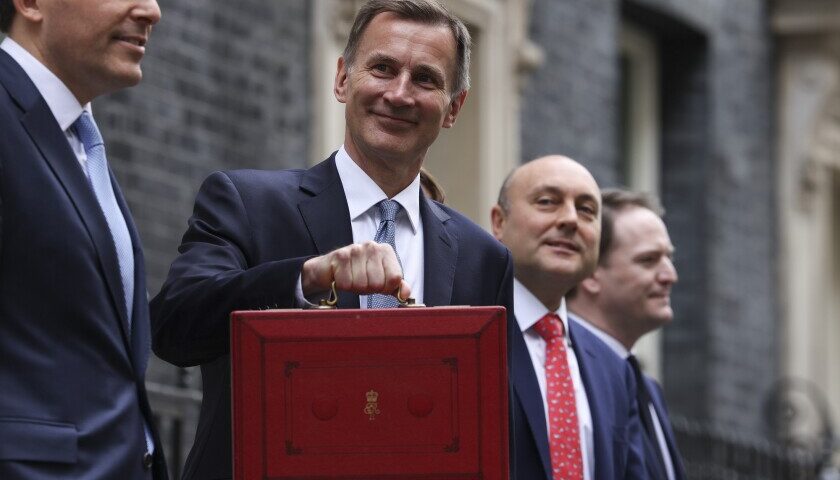Tax Changes in the Autumn Statement
INCOME TAX
‘Stealth’ increases
The personal allowance and basic rate band threshold are still frozen at their 2021/22 levels and, subject to the outcome of the next general election, are expected to remain at such until 5 April 2028. As earnings increase, individuals will move into higher tax bands. This is often referred to as ‘fiscal drag’ because it will raise more tax without the government increasing income tax rates.
The tax-free personal allowance of £12,570 continues to be partially and then fully withdrawn for higher earners, with £1 of personal allowance lost for every £2 of adjusted net income over £100,000.
Income tax rates and allowances for 2024/25
Held at their 2023/24 levels, the following income tax rates will apply to taxable income, after the personal allowance has been utilised.
| Band |
Taxable Income |
Tax rate in 2024/25 |
|
|
Earned income (e.g. wages, business profits and rental profits) |
Savings income |
Dividend income |
| Basic rate |
£0 – £37,700 |
20% |
20% |
8.75% |
| Higher rate |
£37,701 – £125,140 |
40% |
40% |
33.75% |
| Additional rate |
Over £125,140 |
45% |
45% |
39.35% |
Other allowances
Savings income continues to benefit from a 0% personal savings allowance of £1,000 for basic rate taxpayers and £500 for higher rate taxpayers.
Dividend income attracts a 0% dividend allowance of £500 in 2024/25, down from the £1,000 allowance seen in 2023/24.
Scotland
Individuals living in Scotland and classed as Scottish taxpayers are also entitled to the personal allowance of up to £12,570 but have a slightly different banding system for ‘earned income’ as follows:
| Band |
Taxable Income |
Tax rate in 2023/24 |
| |
|
Earned income |
| Starter rate |
£0 – £2,162 |
19% |
| Basic rate |
£2,163 – £13,118 |
20% |
| Intermediate rate |
£13,119 – £31,092 |
21% |
| Higher rate |
£31,093 – £125,140 |
42% |
| Top rate |
Over £125,140 |
47% |
The application of income tax to savings and dividends income is the same as for taxpayers based elsewhere in the UK.
The Scottish Budget, in which rates and bands for 2024/25 are expected to be announced, is set to take place on 19 December 2023.
Tax Efficient Savings
The annual limits for Individual Savings Accounts (ISAs), Child Trust Funds and the Junior ISA remain at £20,000, £9,000 and £9,000 respectively in 2024/25. The lifetime ISA annual subscription limit also remains unchanged at £4,000 (excluding the government top-up bonus).
The government is making changes to simplify ISAs and provide more choice, meaning it will be easier to choose the best ISA accounts and move money between them. This involves digitalising the ISA reporting system to make it more effective, as well as expanding the investment opportunities available in ISAs.
Pension tax relief
Annual allowances determine the maximum amount that an individual can save into their pension pots in a tax year before tax relief starts to be withdrawn by way of pension tax charges.
These allowances will remain fixed in 2024/25 at their 2023/24 rates, being the £60,000 annual allowance applicable in most circumstances and the £10,000 money purchase annual allowance for those who have flexibly accessed their pension pot. The annual allowance is reduced for those with a high income of more than £260,000.
PENSION REFORM
The government has announced a comprehensive package of pension reforms that aim to provide better outcomes for savers, drive a more consolidated pensions market and enable pension funds to invest in a diverse portfolio.
With people (especially younger generations) changing jobs more frequently than used to be the case, the government wants to tackle the long-standing problem of “small pot” pensions that accumulate with each short to medium term employment. There will be a call for evidence on a ‘lifetime provider model’ which would allow individuals to have contributions paid into their existing pension scheme when they change employer, providing greater agency and control over their pension.
CAPITAL GAINS TAX
The capital gains tax annual exemption is set to drop to £3,000 in 2024/25, down from £6,000 in 2023/24. This change will mean that those selling capital assets such as property or shares will pay more tax, where the new lower annual exemption is exceeded. Capital gains tax rates range from 10% to 28% in 2023/24, depending on the tax status of the seller and the type of asset sold.
If you are planning any capital disposals, please contact us to discuss the best strategy for the disposal.
INHERITANCE TAX
The inheritance tax nil rate band continues to be frozen at £325,000 until April 2028. The residence nil rate band will also remain at £175,000 and the residence nil rate band taper will continue to start at £2million. Despite prior rumours to the contrary, there has been no change to inheritance tax rates.
CORPORATE TAXES
Rates from 1 April 2024
From 1 April 2024, the rate of Corporation Tax will continue to be 25% if a company’s profits exceed £250,000 a year. The small profits rate of 19% will apply where profits are no more than £50,000 a year.
Where a company’s profits fall between £50,000 and £250,000 a year, the profits are taxed at the higher 25% rate, but a ‘marginal relief’ is given to reduce the liability, with the effective rate being closer to 19% the closer profits are to £50,000.
Companies in the same corporate group (or otherwise connected by association) must share the £50,000 and £250,000 thresholds between them, making the 25% rate more likely to apply. A similar rule applies to the £1.5million threshold which, if exceeded, means that companies are required to pay their corporation tax earlier and in instalments.
Research & Development (R&D) Reliefs
For company accounting periods commencing on or after 1 April 2024, a new R&D scheme for limited companies will come into effect, merging the current R&D Expenditure Credit (RDEC) scheme (for larger companies) with the Small and Medium Enterprise (SME) scheme. There will also be a second new R&D scheme for ‘R&D intensive SMEs’.
These are significant changes and come on top of a raft of changes already seen in 2023. HMRC say that further action may still be needed to reduce the unacceptably high levels of non-compliance with tax rules in the R&D sector.
Within the new rules there are new provisions in relation to:
- Who can claim relief when companies contract out R&D activities;
- The definition of qualifying expenditure, taking into account whether the R&D has been undertaken in the UK,
- The qualifying criteria for ‘R&D intensive’ companies, along with a new approach for companies who many fluctuate in and out of the status; and
- Restrictions on nominations and assignments of R&D relief payments.
Any company claiming (or considering claiming) R&D reliefs will need enhanced support to both ensure compliance and to adopt the new rules and framework. Please do get in touch if we can assist you with this.
Creative Industries
Film, TV and video games tax reliefs will be reformed into refundable expenditure credits. In particular, an Audio-Visual Expenditure Credit (AVEC) for film and TV programmes and a Video Games Expenditure Credit (VGEC) for video games. The credits will be available from 1 January 2024.
Annual Tax on Enveloped Dwellings (ATED)
The ATED annual charges will rise by 6.7% from 1 April 2024 in line with the September 2023 CPI.
EMPLOYMENT TAXES
National Insurance Contributions (NICs)
Like the main income tax bandings, employer and employee NIC thresholds are now also frozen until 5 April 2028. This broadly means that, in 2024/25, employers’ NIC will continue to apply at 13.8% to earnings in excess of £9,100 a year (£175 per week) and employees will pay at the reduced 10% rate on earnings between £12,570 and £50,270 and 2% thereafter.
For eligible employers, the employment allowance remains at £5,000 per year, reducing their employer’s NIC liability by this sum. Eligible employers should remember to opt in on their payroll software to ensure that the allowance is received.
Company Cars and Other Benefits
Employees are required to pay income tax on certain non-cash benefits. For example, the provision of a company car constitutes a taxable ‘benefit in kind’. Employers also pay Class 1A NIC at 13.8% on the value of benefits.
The set percentages used to calculate company car benefits are fixed until 5 April 2026 before slight increases apply to most car types, including electronic and ultra-low emission, from 6 April 2026.
The figures used to calculate benefits-in-kind on employer-provided vans, van fuel (for private journeys in company vans), and car fuel (for private journeys in company cars) remain fixed at their 2023/24 levels in 2024/25. These are:
- Van benefit £3,960
- Van fuel benefit £757
- Car fuel benefit multiplier £27,800
PAYE and Tax Returns
For individuals with income taxed only through PAYE, they currently only need to file a self-assessment tax return if their income exceeds £150,000. From 2024/25 this threshold will be removed altogether, removing up to 338,000 individuals from the self-assessment system.
Off-payroll Working (IR35)
Off-payroll working rules ensure that a worker who provides services through an intermediary company to a ‘deemed employer’ pays broadly the same income tax and NIC as an employee would. The rules are complicated and apply differently depending on the size and type of the deemed employing entity.
The new rules deal with cases where HMRC is collecting underpaid PAYE from the deemed employer and will allow them to give credit for any tax and NIC already paid by the worker and their intermediary. This is to avoid the potential over-collection of tax.
TACKLING THE TAX GAP AND COLLECTING HMRC DEBT
The government continues to commit to a tax system that is easy for businesses and individuals to engage with, and where everyone pays their fair share.
A ‘Tackling the Tax Gap’ package of measures has been announced, with plans to raise £5 billion of tax revenue over the next five years. The government is investing in HMRC’s ability to better target their debt collection activity, pursuing those with tax debts that can afford to pay, and providing support to those that are temporarily unable to pay. The government is also taking action against those who continue to bend or break the rules, by reducing opportunities for tax fraud in the construction industry and taking strong action against promoters of tax avoidance. Sentences for the most egregious forms of tax fraud will be doubled from 7 to 14 years.
TAX ADMINISTRATION FRAMEWORK
New measures will be introduced to strengthen HMRC’s data gathering powers. From 2025/26:
- Employers will be required to provide data on employee hours paid as part of their PAYE reporting; and
- Shareholders in owner-managed businesses will be required to include on their self-assessment tax return their percentage shareholding and dividend income from their company (separately to any other dividend income they may receive).
These measures will build on previously announced HMRC powers that will enable them to access taxpayer data from online marketplaces (e.g. from airbnb) from 1 January 2024.
IN CONCLUSION
As we move into 2024, there are a lot of tax changes already scheduled, plus we can expect more with a Spring Budget and a general election on the horizon.
We are here to work alongside you and help you prosper so please do get in touch at any time.










